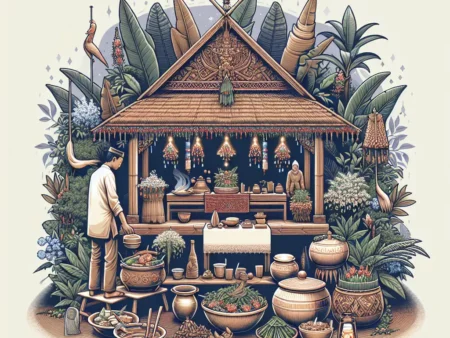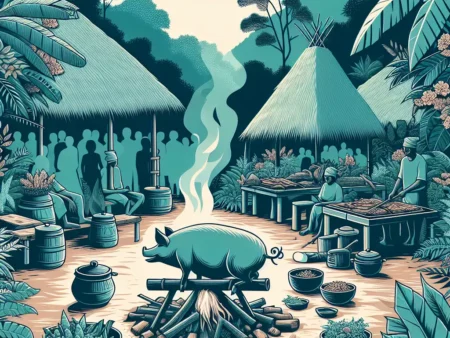Upacara Adat Barapen di Papua adalah ritual pesta bakar batu yang memiliki makna penting dalam budaya dan tradisi masyarakat Papua.
Makna Upacara Adat Barapen di Papua: Ritual Pesta Bakar Batu
-
Table of Contents
Makna Upacara Adat Barapen di Papua: Ritual Pesta Bakar Batu

Introduction
The province of Papua, located in the easternmost part of Indonesia, is known for its rich cultural heritage. One of the most fascinating traditions practiced by the indigenous people of Papua is the Barapen ceremony, also known as the Ritual Pesta Bakar Batu. This traditional ceremony holds deep cultural and spiritual significance for the Papuan people, and it is a celebration of unity, gratitude, and harmony with nature. In this article, we will explore the meaning and significance of the Barapen ceremony, its rituals, and its importance in preserving the cultural identity of the Papuan people.
The Significance of the Barapen Ceremony
The Barapen ceremony is a communal feast that involves the cooking of various foods using hot stones. It is a significant event in the lives of the Papuan people, as it marks important milestones such as weddings, births, and harvest seasons. The ceremony is also held to honor and remember the ancestors, who are believed to be present during the event. The Barapen ceremony is not only a celebration of abundance and prosperity but also a way to strengthen the bonds within the community.
The Rituals of the Barapen Ceremony
The Barapen ceremony involves several rituals that are performed with great care and precision. The first step is the selection of the stones, which are carefully chosen based on their size, shape, and heat retention properties. These stones are then heated in a fire until they reach the desired temperature. Meanwhile, the food, which usually includes various types of meat, vegetables, and tubers, is prepared and wrapped in banana leaves.
Once the stones are hot enough, they are carefully arranged in a pit, and the food packages are placed on top of them. The pit is then covered with leaves and soil to create an oven-like environment. The food is left to cook for several hours, allowing the flavors to meld together and create a delicious feast. During this time, the participants engage in traditional dances, songs, and storytelling, creating a festive atmosphere.
The Symbolism of the Barapen Ceremony
The Barapen ceremony is deeply rooted in the spiritual beliefs of the Papuan people. The hot stones used in the cooking process symbolize the ancestors, who are believed to provide warmth, protection, and guidance to the community. The act of cooking the food on these stones represents the connection between the living and the deceased, as well as the harmony between humans and nature.
The communal aspect of the Barapen ceremony is also significant. It serves as a reminder of the importance of unity and cooperation within the community. The sharing of food during the feast symbolizes the sharing of resources and the spirit of generosity. It is a way for the Papuan people to express gratitude for the abundance provided by nature and to strengthen the bonds between individuals and families.
The Importance of Preserving the Barapen Ceremony
In recent years, the Barapen ceremony has faced challenges due to modernization and external influences. The younger generation is increasingly exposed to Western culture, and traditional practices are at risk of being forgotten. However, efforts are being made to preserve and promote the Barapen ceremony as an integral part of Papuan cultural heritage.
Preserving the Barapen ceremony is crucial for several reasons. Firstly, it helps to maintain the cultural identity of the Papuan people. The ceremony is a reflection of their unique traditions, beliefs, and way of life. By participating in the Barapen ceremony, the younger generation can develop a sense of pride and belonging to their cultural heritage.
Secondly, the Barapen ceremony plays a vital role in promoting social cohesion and unity within the community. It brings people together, fostering a sense of togetherness and solidarity. The ceremony provides an opportunity for the older generation to pass down their knowledge, wisdom, and values to the younger generation, ensuring the continuity of Papuan traditions.
Lastly, the Barapen ceremony serves as a reminder of the importance of sustainable practices and the harmonious relationship between humans and nature. The ceremony emphasizes the need to respect and protect the environment, as it is the source of life and abundance. By preserving the Barapen ceremony, the Papuan people can contribute to the global efforts of promoting sustainable living and cultural diversity.
Conclusion
The Barapen ceremony, also known as the Ritual Pesta Bakar Batu, is a significant cultural tradition in Papua, Indonesia. It holds deep spiritual and cultural meaning for the Papuan people and serves as a celebration of unity, gratitude, and harmony with nature. The ceremony’s rituals and symbolism reflect the strong connection between the living and the deceased, as well as the importance of community and sustainable practices.
Preserving the Barapen ceremony is crucial for maintaining the cultural identity of the Papuan people, promoting social cohesion, and fostering a harmonious relationship with the environment. Efforts must be made to ensure that this unique tradition continues to thrive and be passed down to future generations. By doing so, the Papuan people can contribute to the preservation of cultural diversity and the promotion of sustainable living.







